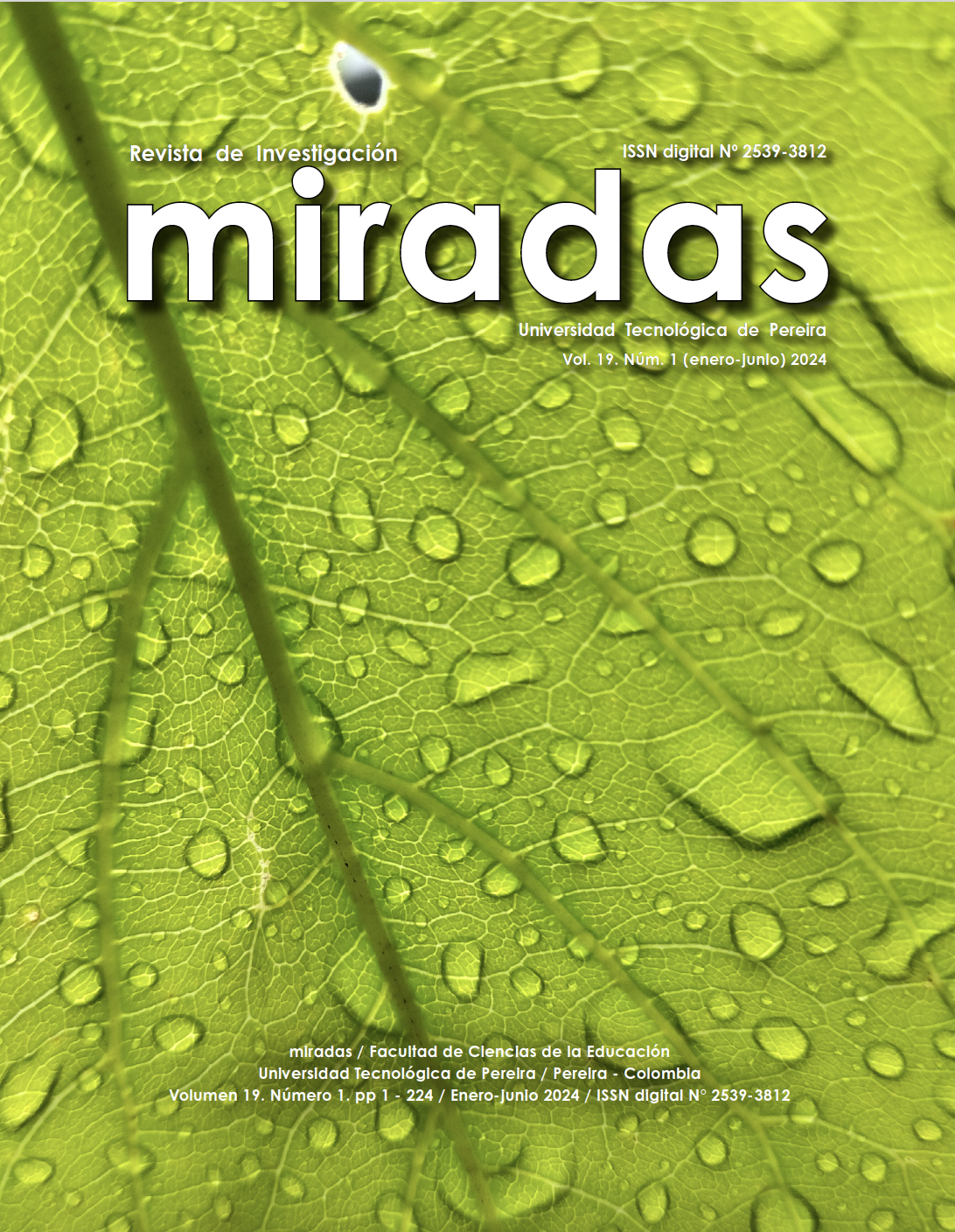Betting on art as the foundation of recreationalpedagogical: A path towards inclusion and strengthening educational equity in the teaching-learning process
DOI:
https://doi.org/10.22517/25393812.25465Abstract
The educational field, specifically in the rural sector, has been seriously affected by an educational system that governs everyone equally, but that unfortunately does not guarantee education with the same benefits for everyone, from the recognition of diversity and equity as pillars in teaching and institutional actions.
The present research commitment is therefore born from the interest in strengthening the teaching-learning processes with students between the ages of 6 and 8 who present learning difficulties at the El Poblado rural educational institution of the Municipality of Puerto Asís, through the playful guide. -pedagogical “EquiGuía”, seeking to promote educational equity. The research is carried out under a Qualitative approach, which allows us to reliably find the information from the reading of reality, corroborating the results, and executing a proposal for action, to finally assess the effectiveness of the actions taken and carry out a process and reflective analysis of the process, all under the perspective of Participatory Action Research.
On the other hand, the research commitment allowed us to recognize contributions on the importance of education in the social sphere; To understand the realities of rural education from the recognition of diversity and equity as pillars in teaching and institutional actions, a holistic view must be taken of the phenomenon. Therefore, it is considered a main element of teaching strategies and learning, the development of classroom processes, through playful methods, these highlight positive pedagogical elements, due to their characteristics: the variety in pedagogical processes, fun didactics, enjoyment of the activities, among others, that generate learning environments pleasant to students while developing cognitive skills such as the capacity for analysis, reflection, interpretation and co-construction of content, something that can be almost impossible to acquire with traditional study techniques.
Accordingly, without a doubt the disinterest of students should become a worrying element for teachers since it is an indicator of the low effectiveness of current pedagogical processes; students should be motivated, incentivized and stimulated with playful strategies. -pedagogical according to their characteristics, interests and/or needs, but traditional and routine strategies have only generated discouragement and disinterest on the part of students in their school environment, who should be the greatest motivation for the generation of comprehensive students with abilities and ability that allows them to develop in the most appropriate way in society.
Downloads
References
Alvarado, S. (2018). La lúdica como estrategia pedagógica para el fortalecimiento de la atención
en el aprendizaje en niños (a) de preescolar de la Escuela Normal Superior de Ibagué Sede “Centro Piloto”. [Tesis de pregrado, Universidad del Tolima]. Repositorio institucional.
Añaños, E. (2013) Psicología de la atención y de la percepción. Servei de Publicacions de la Universitat Autònoma de Barcelona.
Arcos, J. (2018). Teorías que sustentan el desarrollo socio afectivo en la infancia. [Tesis de pregrado, Universidad Nacional de Educación]. Repositorio institucional.
Banco Mundial (2021). Estudio sobre la inequidad educativa en América Latina. https://www.
bancomundial.org/es/news/press-release/2021/03/17/hacer-frente-a-la-crisis-educativa-en-america-latina-y-el-caribe
Barrio, J. (2009). Hacia una educación inclusiva para todos. Revista complutense de educación. 20(1), 13-32. https://dialnet.unirioja.es/servlet/articulo?codigo=2973694
Blanco G. (2006). La equidad y la inclusión social: Uno de los desafíos de la educación y la escuela hoy. REICE. Revista Iberoamericana sobre calidad, eficacia y cambio en Educación, 4(3), 1-15.
Córdoba, H. (2017). Investigación cualitativa. Fondo editorial Areandino.
Booth, T. y Ainscow, M. (2000). Guía para la educación inclusiva. Desarrollando el aprendizaje y la participación en los centros escolares. Grafilia.
Candela, Y. y Benavides, J. (2020). Actividades lúdicas en el proceso de enseñanza-aprendizaje de los estudiantes de básica superior. Revista de Ciencias Humanísticas y Sociales (ReHuSo), 5(3), 90-98. https://doi.org/10.33936/rehuso.v5i3.3194.
Carro, A., Lima, J. y Carrasco, M. (2018). Los consejos técnicos escolares para la inclusión y equidad educativa en la educación básica de Tlaxcala, México. Revista Electrónica Educare, 22(1), 146-175. https://dx.doi.org/10.15359/ree.22-1.8.
Junca, G. (2018). La persistencia de la inequidad y la desigualdad en la educación en Colombia. Revista Papeles, 10(19), 26-39.
Klimenko, O. (2009). La enseñanza de las estrategias cognitivas y metacognitivas como una vía de apoyo para el aprendizaje autónomo en los niños con déficit de atención sostenida. Revista Virtual Universidad Católica del Norte, 1(27), 1-19. https://revistavirtual.ucn.edu.co/index.php/RevistaUCN/article/view/100/198.
Observatorio de Educación. (2020). Informe de la Universidad del Rosario. https://urosario.edu.co/observatorio-de-venezuela/informes.
OCDE. (2018). Informe de la Organización para la Cooperación y el Desarrollo Económicos. https://www.oecd.org/acerca/.
PNUD. (2016). Informe sobre Desarrollo Humano. Desarrollo humano para todos. https://hdr.undp.org/system/files/documents/hdr2016spoverviewwebpdf.pdf.
Roemer, J. (2000). Variantes de la igualdad de oportunidades. Fractal, 16(5), 151-171.
Rojas, S. (2018). ¿Se puede hablar de equidad en el sector educativo colombiano?. Revista Científica Gen. José María Córdova. 16(23), 125-143. http://dx.doi.org/10.21830/19006586.286
Silva, M. (2019). Tres iniciativas de equidad educativa universitaria en la Ciudad de México. Revista mexicana de investigación educativa, 24(80), 43-68.
Silva, M., D´Angelo, N. y García, E. (2017). Evaluación del proyecto educativo de la UACM. Reporte técnico. https://www.uacm.edu.mx/Portals/0/DNNGallery/uploads/2017/10/16/EVALUACION_PROY_EDUCATIVO.pdf
Trejos, S. (2005). ¿Equidad o desigualdad? En la política educativa del Putumayo, desde la enseñanza social de la iglesia. Editorial Universidad Alberto Hurtado.
UNESCO. (2020). Informe de seguimiento de la educación en el mundo. Inclusión y educación: todos y todas sin excepción. https://unesdoc.unesco.org/ark:/48223/pf0000374817.
Downloads
-
Vistas(Views): 271
- PDF (Español (España)) Descargas(Downloads): 118



